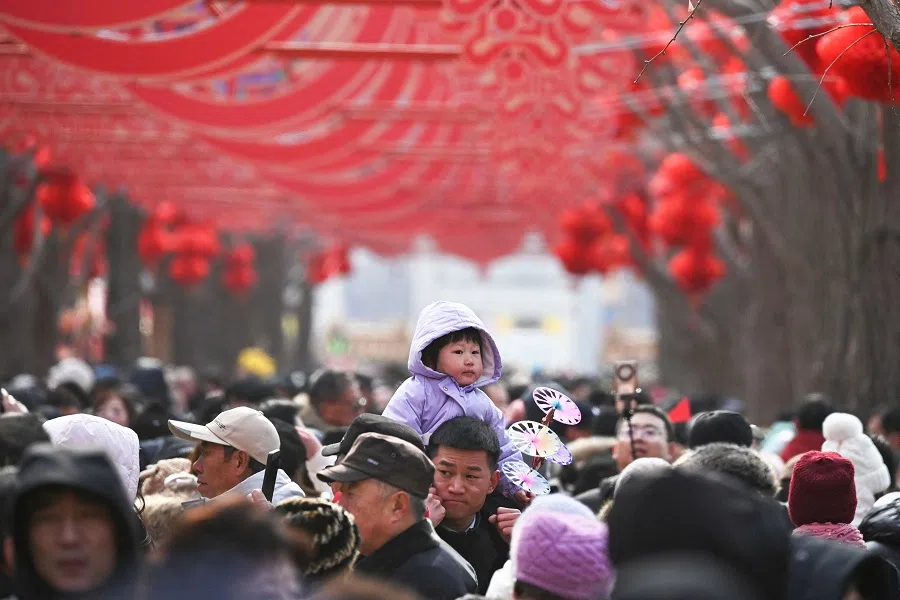China’s youths fall out of love with marriage
Younger generations in China are increasingly shunning marriage, put off by the high costs of starting a family. To tackle the issue, the Chinese government may be better off focusing on boosting the sluggish economy, says Lianhe Zaobao China news editor Yang Danxu.

“If getting married is so great, why would we need to promote it? Would one need reminding if there’s free money on the ground for the picking?”
Following the release of the latest statistics on marriage registrations by China’s Ministry of Civil Affairs, the issue of young people not getting married has once again sparked conversations online. Some critics argued that youths today are selfish individualists who are unwilling to take on the responsibilities of marriage. Others countered by stating that such an opinion is moral coercion, adding that if marriage were truly so wonderful, who would not want to get married?
The latest data showed that in 2024, only 6.106 million couples registered for marriage in China, a sharp decline of 20.5% compared to the previous year. This not only marks the largest drop since related statistics began in 1986, but it is also a mere half of the historical peak recorded in 2013, when 13.469 million couples registered for marriage.
Looking back, at the start of last year, a saying circulated in China that the 2024 Year of the Dragon was one devoid of Lichun (立春) or a “year without spring”, also known as a “widow year” (寡年) — inauspicious for marriage. This online buzz even caught the attention of the authorities then, prompting mainstream media to enlist experts to debunk the idea that a “year without spring” was unsuitable for marriage.
Whether these superstitious beliefs caused many to deliberately avoid marrying in the Year of the Dragon which just passed — potentially leading to the sharp drop in marriage registrations last year — lacks concrete data for verification. Putting aside superstitious beliefs, young people in China have a host of other reasons for not wanting to marry, judging by the sentiments reflected on the Chinese internet.
... the cost of marriage is too high; the investment and effort required of marriage do not match the returns. Secondly, values relating to marriage have changed — marriage is no longer seen as an essential part of one’s life plan.
Societal issues and expectations a key obstacle to marriage
Some netizens have listed the potential challenges a marriage could bring: dowry price, wedding expenses, housing, cars, arguments, cold violence (silent treatment, a form of emotional abuse), having a “mama’s boy” husband, conflicts between daughter-in-law and mother-in-law, having children, raising children, having a second child, housework, school district housing, to infidelity, domestic violence and divorce.

Some female netizens noted that marriage can drastically reduce one’s sense of happiness — by not marrying, at least the only “crime” is not being married. However, the list of expectations and other potential “crimes” will increase upon marriage, including not having children, not having male children, not having a second child, not doing housework, not serving one’s husband, not being filial to one’s in-laws, going out to work (which means not raising children), and staying at home to raise children (which means not earning money), among many other things.
In sum, the main reasons for “marriage phobia” cited by netizens fall into two categories. Firstly, the cost of marriage is too high; the investment and effort required of marriage do not match the returns. Secondly, values relating to marriage have changed — marriage is no longer seen as an essential part of one’s life plan.
Some joked that “it’s not that I don’t want to get married, but getting married would mean the entire family would have to starve”.
High costs associated with marriage
Marriage has never been cheap in China, and the strong correlation between marriage and purchasing a home, along with the high dowry prices in some regions, has always been an obstacle for many considering marriage. Expenses incurred for the wedding itself are also a “sweet burden”. In 2023, the Center for Population and Development Studies of Renmin University of China conducted a survey which found that the average cost of a wedding in China was as high as 330,000 RMB (US$45,492) — eight times the per capita disposable income in the same year. Some joked that “it’s not that I don’t want to get married, but getting married would mean the entire family would have to starve”.
To many youths, these costs are just the beginning. The expenses of raising children after marriage, housing loan repayments after making a down payment, and the time and mental effort required to maintain a marriage and manage a family amid social pressure and workplace competition all make many people hesitant about getting married.

Similar to many relatively developed East Asian countries, the declining marriage and birth rates among young people in China reflect changing views on marriage. The younger generation, which has a more open-minded view of marriage, prioritises marital quality and personal values and the pursuit of a freer lifestyle.
Many believe that prioritising having a wife, children and a warm bed (老婆孩子热炕头, the traditional depiction of a simple and good life), and considering the failure to have children as being the worst of the “three unfilial acts” is outdated. For women who are increasingly educated and economically independent, marriage is no longer necessary for financial security. Instead, they resent the traditional familial division of labour that often leads to “widowed parenting”, where the mother bears the brunt of childcare and housework.
Properties for newlyweds and those located in desirable school districts have long been considered rigid demand. Now, with fewer people getting married, it is unclear how this rigid demand will be sustained.
Demographic issues imminent
In just over a decade, the number of Chinese people getting married has halved, a leading indicator of the decline in births. Renowned demographer Yi Fuxian warned in a media interview that if this trend continues, the Chinese government’s political and economic ambitions will be undermined by its “demographic Achilles heel”.
The weak desire to marry and have children, coupled with the difficult-to-reverse trend of population decline, clearly poses a potential challenge to China’s economic growth. At a time when the government is striving to prop up the property market and desperately trying to boost consumption, the trends in marriage and childbirth make it difficult to be overly optimistic about the effectiveness of these efforts.
Population growth is a core driver of real estate development, and housing is a standard feature in most Chinese marriages. Properties for newlyweds and those located in desirable school districts have long been considered rigid demand. Now, with fewer people getting married, it is unclear how this rigid demand will be sustained.

Beyond the property market, various types of consumption spanning people’s entire life cycles will also be affected by the declining desire to marry and have children, such as wedding ceremonies, banquets, infant formula, children’s products, childcare services, education, healthcare, dining, clothing, home appliances, automobiles, entertainment, and so on. Population decline has a self-reinforcing inertia, and its drag on consumption will only become more pronounced.
If such pessimism is fuelling this marriage phobia, the more pressing priority is to rebuild confidence and revitalise the economy.
Should the focus be on the economy instead?
Following the release of the latest marriage registration data, some analysts hypothesised that China’s economic downturn is the primary reason for the sharp decline in marriages last year. Slow income growth, job insecurity, involution, as well as anxiety about the present and unease about the future are making young people hesitate and avoid the risks and responsibilities of marriage and family.
If such pessimism is fuelling this marriage phobia, the more pressing priority is to rebuild confidence and revitalise the economy. Even if structural issues like the changing views on marriage are difficult to reverse, economic improvement could, at the very least, slow down the wave of marriage phobia.
This article was first published in Lianhe Zaobao as “当结婚不再是刚需”.





